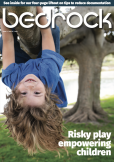
Content warning: this article discusses themes including sexual assault and violence that may be distressing to some readers.
The woman behind the ground-breaking Teach Us Consent petition, Chanel Contos, talks to Emily Campbell about her experiences at school, acting collectively, and educational change to end gendered violence.
“Be ruthless with systems and kind with people”, are the words of wisdom that open Chanel Contos’s debut book, Consent laid bare: Sex, entitlement & the distortion of desire, published in September 2023.
Now in her mid-20s, Contos has already achieved so much, most notably spearheading the movement for mandatory consent and respectful relationships education in Australian schools through the Teach Us Consent campaign.
Contos was awarded the Australian Human Rights Commissions Young People’s Medal in 2021; is listed among the BBC’s annual ‘100 Women’ series of inspiring and influential women, and in 2023 was named NSW Young Woman of the Year. Contos’s dream is to become a school principal.
Attending Kambala
Kambala Church of England Girls’ School in Rose Bay overlooks picturesque Sydney Harbour and welcomes day and boarding students from preparation to Year 12.
Contos attended Kambala from Year 5 on, and has fond memories of her time there – particularly of late-night study sessions in the library with friends.
“Attending Kambala massively shaped me as a person – I had the best time at school and loved it,” Contos says.
“I met so many amazing friends who remain my friends today, and I had such a good year group who weren’t cliquey.”
Contos says the school staff at Kambala instilled confidence in its young women students and encouraged critical thinking, integrity and feminism.
“I feel like it was ingrained in us from a young age that we could be the best versions of ourselves in various ways,” she says.
“Ms [Jennifer] Crossman was our head of senior school, and she was instrumental in motivating us to be confident and to be feminists.
“When girls were presented with an award at a school assembly, she would make sure every girl went up on stage and shook her hand.
“At the time, it felt awkward and formal, but she said so many men walk into rooms and shake people’s hands, and we should also have the confidence to do that.
“I think even small things like that have gone a long way to helping me feel comfortable as I work in male-dominated spaces like politics.”
Dr Kate Narev and Mr Curtis are also among the memorable teachers who inspired and supported Contos during school. Dr Narev has gone on to work in the gender equality field.
“School is so important in shaping a person, which is why I spend so much time advocating for schools to improve their consent education, because it has the potential to change the whole culture of a country,” Contos says.
Teach Us Consent campaign
In 2021, while she was living and studying in London, Contos posted a poll on Instagram asking followers: “Have you or has anyone close to you ever been sexually assaulted by someone who went to an all-boys school in Sydney?”
Within 24 hours, 200 people had responded ‘yes’. Contos was schocked but not suprised by these responses.
The next day, she created a petition calling for holistic, earlier consent education for school students. The petition attracted 45,000 signatures.
Contos then launched teachusconsent.com, a platform through which victim-survivors could anonymously share their experiences. It has since received 6700 testimonials and submissions.
The Teach Us Consent petition and testimonies were presented to Members of Parliament throughout Australia, with Contos calling for age-appropriate consent education to be mandated in the national Australian Curriculum.
“It was obviously really devastating to read all those stories, but it also felt validating in a weird way because I knew that they existed,” Contos says.
“I found it heartwarming that people were willing to share their experiences with me and the public.”
Seismic shift in reporting sexual assault
Contos’s fierce advocacy sparked an ongoing national conversation about sex education in schools and shone a spotlight on the devastating consequences resulting from the lack of explicit teaching of consent.
Since the inception of Teach Us Consent, monumental changes have been made to the legal and education systems.
In March 2021, Contos helped NSW police launch Operation Vest, which provided an informal avenue for victim-survivors to report sexual assault.
This saw an unprecedented 54 per cent month-on-month increase in the reporting of sexual assault in NSW, as reported on the Teach Us Consent website.
More recently, Contos’s unwavering advocacy has directly led to Queensland and South Australia passing laws to criminalise ‘stealthing’. This means removing a condom without consent, a form of sexual assault which is not widely known.
“Teach Us Consent’s mission is fundamentally about putting consent, empathy and respect at the heart of sex education,” Contos says.












































































































































